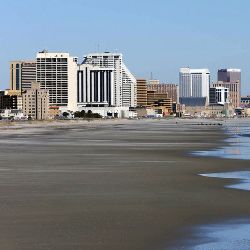Atlantic City Struggles To Avoid Bankruptcy

Atlantic City is going through tough times, with the seaside resort inching ever closer to bankruptcy. In a last ditch effort to avoid that, the city’s affairs have now been placed in the hands of an emergency manager who has taken over its operations, but will it be enough to save Atlantic City? If we take a look at the past, the city has proven to be resilient enough to weather times of bust; however, is the deck stacked against the East Coast gambling resort area this time around?
More Gambling Not the Solution
Industry experts agree that more gambling isn’t going to be the solution to the problem. Yes, its true that in 2014 the city had 12 casinos, but today just seven remain open, with the loss of jobs placing further strain on the economy. However, many believe that the market has now shrunk to the right size, and that with the existing casinos now facing less competition that they may be able to weather the current financial storm.
In other words, more casinos and increased competition are not the answer, and it seems the people of New Jersey agree. Back in November, for instance, voters weighed in on a proposal to issue two new casino licenses in the northern part of the state. The people of the Garden State subsequently made their views clear, overwhelmingly voting against the proposal and indicating that they also see more gambling as a poor solution to AC’s financial difficulties.
Increased Competition from Nearby States
Overall, casino revenue is down in Atlantic City because as more casinos are built in the eastern United States, there simply exists less interest in heading to the gambling resort despite its picturesque views and scenery. Moreover, Atlantic City simply isn’t big enough to become the flashy gambling mecca that Las Vegas is, thus making it even harder for AC to lure travelers back to its gambling venues.
Some Good News
But, the news isn’t all bad. The casinos that are still open in Atlantic City are seeing their profits increase for the most part. Resorts, for instance, had a 525 percent increase in operating profits from 2014 to 2015, while the Golden Nugget saw its profits increase more than 396 percent. In fact, the only casino that didn’t see at least a minor surge in profits was the Tropicana.
What’s clear, however, is that the profits aren’t having a major trickle down effect. With casinos continuously closing, unemployment is on the rise and small businesses that rely on consumer revenues are closing. As a result, the city has not been able to get the tax revenues that is needs to stay in the black from the casinos alone.
More Recreational Facilities Needed
Some industry experts believe that what may ultimately end up saving Atlantic City is, what is right now, the symbol of its past failures, namely the closed casinos. If the current properties could be converted to something other than casinos, then Atlantic City may be able to start attracting more visitors once more. That has really been the secret sauce that has made Las Vegas successful, as people don’t just go there to gamble, but also to take in its various entertainments, and have fun.
Emergency Manager Appointed
If developers take a cue from Sin City, and the emergency manager, Jeffrey Chiesa, proves to be skilled at his job, Atlantic City may have a chance of rebounding. Chiesa was tasked with overseeing the takeover of AC by the state of New Jersey in November, and he is certainly well qualified to do so having served as both a U.S. senator, as well as a New Jersey’s attorney general. Furthermore, Chiesa has been granted wide-ranging powers to prevent the seaside resort from defaulting on its debt and declaring bankruptcy. As Moody’s rating agency stated recently:
“While the state has not officially guaranteed Atlantic City’s debt, Director Cunningham has said the state intends to prevent any default,” in a reference to the director of the Division of Local Government Services expressed willingness to approach the state treasury for monetary help if deemed necessary.







